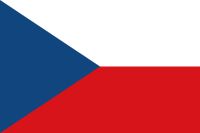 The Czech Republic (pronounced /ˈtʃɛk/ chek; Czech: Česká republika, pronounced [ˈtʃɛskaː ˈrɛpuˌblɪka], short form Česko [ˈtʃɛskɔ]) is a landlocked country in Central Europe. The country borders Poland to the northeast, Germany to the west and northwest, Austria to the south and Slovakia to the east. The Czech Republic has been a member of NATO since 1999 and of the European Union since 2004. The Czech Republic is also a member of the Organization for Security and Cooperation in Europe (OSCE). As an OSCE participating State, the Czech Republic’s international commitments are subject to monitoring under the mandate of the U.S. Helsinki Commission. From 1 January 2009 to 30 June 2009, the Czech Republic held the Presidency of the Council of the European Union.
The Czech Republic (pronounced /ˈtʃɛk/ chek; Czech: Česká republika, pronounced [ˈtʃɛskaː ˈrɛpuˌblɪka], short form Česko [ˈtʃɛskɔ]) is a landlocked country in Central Europe. The country borders Poland to the northeast, Germany to the west and northwest, Austria to the south and Slovakia to the east. The Czech Republic has been a member of NATO since 1999 and of the European Union since 2004. The Czech Republic is also a member of the Organization for Security and Cooperation in Europe (OSCE). As an OSCE participating State, the Czech Republic’s international commitments are subject to monitoring under the mandate of the U.S. Helsinki Commission. From 1 January 2009 to 30 June 2009, the Czech Republic held the Presidency of the Council of the European Union.
The Czech state or Bohemia (Lands of the Bohemian Crown) as it was known until 1918 was formed in the late 9th century. The country reached its greatest territorial extent during the 13th and 14th century under the rule of the Přemyslid and Luxembourg dynasties. Following the Battle of Mohács in 1526, the Kingdom of Bohemia was integrated into the Habsburg monarchy as one of its three principal parts alongside Austria and Hungary. The independent Republic of Czechoslovakia was formed in 1918, following the collapse of the Austro-Hungarian empire after World War I. After the Munich Agreement, Polish and German occupation of Czechoslovakia and the consequent disillusion with the Western response and gratitude for the liberation of the major portion of Czechoslovakia by the Red Army, the Communist party won plurality (38%) in the 1946 elections.
In a 1948 coup d’état, Czechoslovakia became a communist-ruled state. In 1968, the increasing dissatisfaction culminated in attempts to reform the communist regime. The events, known as the Prague Spring of 1968, ended with an invasion by the armies of the Warsaw Pact countries (with the exception of Romania); the troops remained in the country until the 1989 Velvet Revolution, when the communist regime collapsed. On 1 January 1993, Czechoslovakia peacefully dissolved into its constituent states, the Czech Republic and Slovakia.
The Czech Republic is a pluralist multi-party parliamentary representative democracy. President Václav Klaus is the current head of state. The Prime Minister is the head of government (currently Petr Nečas). The Parliament has two chambers: the Chamber of Deputies and the Senate. It is also a member of the Organisation for Economic Co-operation and Development (OECD), the Council of Europe and the Visegrád Group.
The Czech Republic made economic reforms such as fast privatizations. Annual gross domestic product growth has been around 6% until the outbreak of the recent global economic crisis. The country is the first former member of the Comecon to achieve the status of a developed country according to the World Bank (2006) and the Human Development Index (2009), which ranks it as a “Very High Human Development” nation.
Sports play a part in the life of many Czechs, who are generally loyal supporters of their favourite teams or individuals. The two leading sports in the Czech Republic are football (soccer) and ice hockey, both drawing the largest attention of both the media and supporters. Tennis is also a very big sport in the Czech Republic. The many other sports with professional leagues and structures include basketball, volleyball, team handball, track and field athletics and floorball.
In state hands during the Communist era, much of the Czech Republic’s agricultural and industrial sectors was relatively quickly privatized and showed appreciable growth in the early 1990s. Foreign investment was widely sought. An economic slowdown beginning in 1997, however, revealed problems in the transition from government control to a privatized economy, as many large industrial conglomerates with thousands of employees lost money and sought government aid instead of revamping. In 1999-2000 most of the state-owned banks were privatized, with the government assuming responsibility for bad loans; privatization of the telecommunications industry took place in 2005.
Notes from Wikipedia and Answers.com









